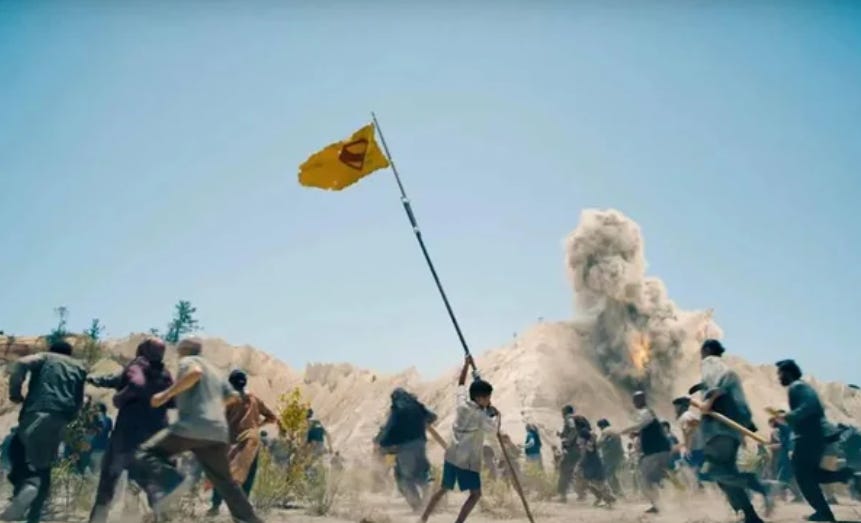I saw James Gunn’s Superman (2025) on Sunday and it made me want to punch something. In the film, Gunn sets up a conflict between two fictional Middle Eastern countries called Boravia and Jarhanpur. Boravia is an analogue for Israel, with pale-skinned people and U.S. military support, and Jarhanpur is one for Palestine, with darker-skinned residents who seem to herd animals. Gunn denies the connection, because like Tony Gilroy making Andor, he has to, but the film’s source material is obvious. The Boravians are colonial aggressors, Jarhanpurians are their victims, and Gunn seems to understand that the same masses he wants to buy his tickets also support Palestine. He then leverages this understanding into one of the most cynical cash grabs I’ve ever seen.
Superman is a “toyetic” movie, which means its success will be measured by how many toys it sells. James Gunn is the first American filmmaker to capitalize on mass support for Palestine to sell American junk. In the film’s final battle, Boravian soldiers in American military fatigues surround defenseless Jarhanpurian men, women, and children in the desert. The scene is clearly based on footage of Zionist soldiers surrounding Palestinians in Gaza. A brown child defiantly raises a flag that would be Palestinian in real life, and a Boravian soldier trains a gun on him. The camera pans up to the flag and it has a Superman logo instead.
I sat back in shock upon seeing this. “Kill yourself,” I hissed at James Gunn in my head. I couldn’t believe he’d use people’s support for victims of genocide to try and get people to buy Superman merch, especially when that merch will only make a Zionist CEO richer. Superman reminded me of Umberto Eco’s argument that fascism is syncretic, or able to absorb the contradictions that threaten it. America’s greatest strength has long been its ability to neuter its internal contradictions, from turning Black Power movements into Civil Rights ones, to letting a Black man become president on the condition that he be a sociopath, to funneling mass opposition to a genocide into superhero movie ticket sales. James Gunn exists in the lineage of Joseph Conrad and Francis Ford Coppola as a liberal racist storyteller at the forefront of that defanging, leveraging his keen sense for what the masses politically believe to sell them validation for a ticket price. He’s perfect for a country that believes, per critic Lauren Oyler, that “acknowledgment [of sins] equals absolution,” and his attempt to parlay his moral disgust for genocide into profit shows the rot at liberal capitalism’s core.
James Gunn, like the worst Gen Xers, is clear-eyed enough to see the world as it is and individualist enough to think he should make money off it. He was born in 1966, which means he would’ve been around 15 when Ronald Reagan was elected. Market fundamentalism replaced the welfare state as the West’s dominant ideology at this time, and from what I understand, individualist propaganda was rife. His films suggest to me that despite his outward liberalism, he absorbed that radical individualism.
In his 2021 film, The Suicide Squad, he has two sympathetic antiheroes mistakenly butcher a group of South American freedom fighters as a joke. Gunn has one freedom fighter gruesomely killed by a shark, another by an axe to the head, three by arrows to the throat, one by having his face mutilated, one by being burned alive, and another by being electrocuted. At the end of the sequence, we’re meant to understand that this was funny because the superheroes didn’t realize the freedom fighters were on their side. I felt sick instead. I thought of all the actual revolutionaries the U.S. murdered across the world, and sat horrified that a grown man would parody that to make their genocidaires money, even as he winked at the audience to let them know he was in on the hypocrisy.
The Suicide Squad, much like Superman, also features fictional foreign countries so Gunn doesn’t have to deal with real ones. In the former, the characters visit a nation called “Corto Maltese,” which is a thinly veiled caricature of U.S.-backed South American dictatorships. Gunn signals that his sympathy is with the country’s working-class revolutionaries, but like Coppola with Asian characters in Apocalypse Now!, he denies them any humanity. Gunn’s countries have no history beyond what he writes from them and their people are little more than plot devices to be enslaved, killed, or crushed. In Superman, he has the only Arab character with a name brutally shot in the head. His ostensible disgust for bigotry disguises a prurient fascination with violence towards brown people. He never turns down a chance to mangle one on-screen.
James Gunn is, to put it bluntly, a racist. He’s no better than the Democrats who passed a bill named after a man the police murdered to fund their departments, nor the president who promised to bring “decency” back to the White House before starting the worst genocide since the Holocaust. His willingness to monetize the public’s knowledge that America’s evil to enrich the people who commit that evil is as cynical to me as Marvel taking army money. I’m sick of his American bullshit: the narcissistic belief that one’s “stance” on the genocide matters more than what we do to stop it. Per the poet Rasha Abdulhadi, our public opinions are irrelevant. All that matters is what we do to throw sand on the gears. If James Gunn wanted to be helpful, he’d use his spotlight to say “Free Palestine” to a few billion people. Otherwise, he should keep it out of his movies.
Tāmaki (Auckland) Events
The Capitol Cinema Film Club is showing Cooley High on Wednesday, July 30 at 8pm. They’ve never shown me a bad movie and you can buy tickets here.



